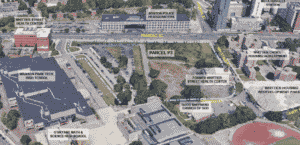
After a series of setbacks, attempts to redevelop Roxbury’s parcel P3 are restarting with an environmental cleanup and possible issuance of a request for proposals from private developers by mid-year. Image courtesy of the BPDA
Roxbury’s city-owned parcel P3 has been a place where development proposals go to die, despite the periodic efforts of top elected officials to spread some of Boston’s building boom into a neighborhood long starved of private real estate investment.
The last proposal – including retail space and 727 residential units – collapsed in 2019 after developers lost a key investor, prompting the Boston Planning & Development Agency to pull the preferred team’s designation. But as the disposition process begins again this month, there are some key differences in how the nearly 8-acre property at Tremont and Whittier streets will be developed.
The city is preparing to begin a targeted environmental clean-up of some of the property’s most contaminated sections that are remnants of its industrial past, even before it selects a preferred development team.
“We’ve known about the contamination for a long time, and [clean-up] was previously the responsibility of the designated developer,” said Devin Quirk, the BPDA’s director of real estate. “Cleaning up the site removes costs from the ultimate development of the site, and we have aspirations for a significant community-oriented development.”
Additionally, a set of new requirements for public parcel dispositions will emphasize equity and inclusion, ranging from the composition of development teams to more specific standards for affordable housing, commercial tenant selection and job creation.
Search for an Anchor
Occupied by commercial and industrial buildings since the 19th century, the property was bulldozed despite community opposition in the 1960s amid plans for a large high school campus and the Southwest Expressway, neither of which came to fruition. In the past two decades, officials have attempted to lure major tenants to serve as anchors for a large private development without success.
Former Gov. Deval Patrick sought to relocate the Massachusetts Department of Transportation headquarters from Park Square to the Roxbury parcel near the end of his term in 2014. The plan was dropped by incoming Gov. Charlie Baker. And in 2013, the late Boston Mayor Thomas Menino lobbied Partners Healthcare to locate a large office complex at parcel P3, but the insurer chose Somerville’s Assembly Row.
The most recent designated developer, Boston-based Feldco, had sought to build housing, a hotel, retail and office space, along with a new home for the Roxbury-based Museum of the National Center of Afro American Artists. It later dropped the office and hotel component from the planned first phase. Even with the scaled-back program, the team lost an investment partner, prompting the BPDA to remove Feldco from the project in late 2019.
This month, the BPDA is restarting the process with a series of community meetings, including one on Feb. 22 focusing on the environmental cleanup as well as visioning sessions for the site’s future.
A Jan. 11 report by GEI Consultants recommended the removal of 10,000 cubic yards of soil and debris on the northeast corner of the property, along with an approximately 250-cubic-yard lead hot spot. It estimates total cleanup costs at $1.3 millon.
And a $250,000 brownfields grant awarded by MassDevelopment in December could be used to remove the lead hotspot and the most highly contaminated portion of the soil mound. That could clear the way for the property to be reopened to the community before the redevelopment begins, according to a BPDA memo.
‘Good Jobs’ and Affordability Standards
Because of its size, parcel P3 is considered a potential accelerator to ongoing revitalization of nearby Nubian Square, where a group of publicly owned parcels are in various stages of disposition and redevelopment. In December, the BPDA selected a team including Suffolk University Center for Real Estate Director Richard Taylor to redevelop parcel 8 as 329,000 square feet of offices, housing, food hall and cultural space.
Like the recent Nubian Square parcels, the parcel P3 teams will be required to conform to the city’s “Good Jobs Strategy Plan,” which support economic advancement in the form of full-time jobs for neighborhood residents. Development teams will be asked to address seven goals for hiring local, Black and female employees and ensuring at least 75 percent of employees working at the property are full-time and all are assigned predictable shifts.
And like other recent public dispositions, parcel P3 also comes with a special set of affordable housing standards. At least one-third of rental units have to be reserved for households earning 30 to 50 percent of area median income. And two-thirds of home ownership units would be offered at a range from 60 to 100 percent of AMI, with the overall average not to exceed 80 percent of AMI.

Steve Adams
“Affordable housing is a significant focus of the community goals for the site, at a range of incomes including low-, middle- and market-rate, which is something we’ve heard throughout the process,” said Morgan McDaniel, a BPDA real estate and community development officer.
The CEO of a Roxbury nonprofit affordable housing developer said those requirements should be the very minimum for parcel P3.
“We see the desperately increasing need for affordable housing, and we would be especially interested in the opportunity to maximize that community benefit at parcel P3,” said Leslie Reid, CEO of Madison Park Development Corp. “It’s a baseline for the city, but we would be interested in a program that exceeds the affordability that’s established by those standards.”





